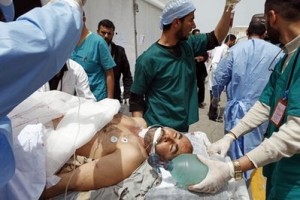Libyan rebel fighters in Misurata have driven forces loyal to Colonel Muammer Gaddafi out of the beleaguered coastal city, but are still being shelled despite the regime’s claims that it has withdrawn its troops from the area.

Misurata, the Libyan opposition’s only western redoubt, has been under siege for over two months, yet fighters have gradually fought Gaddafi’s troops out of the city, the third-largest in Libya, in a bitter street fight that has devastated large parts of the centre.
The rebel fighters late last week flushed out snipers placed in a strategic eight-story building on the main thoroughfare, Tripoli Street, and on Sunday took control of Misurata’s main hospital, which government troops had used as a base, according to newswire reports.
Regime officials have said in the past two days that the military was pulling back in Misurata, ostensibly to enable local tribal chiefs from the area to negotiate with the rebels.
Libyan deputy foreign minister Khaled Kaim said on Friday the army would “leave it to the tribes and the people around Misurata to deal with the situation whether by using force or using negotiations”.
The regime’s claims that the army would withdraw in favour of the local tribes has been met with scepticism by Libyan opposition leaders and western officials.
British Foreign Secretary William Hague told the BBC he doubted Gaddafi’s forces were really going to withdraw. “This may be cover for using more insurgent type warfare without any uniforms and without tanks.”
Newswires reported Gaddafi’s forces were still bombarding Misurata from positions outside the city. The shelling on Sunday killed at least one person and wounded 12, Ahmed Hassan, a rebel spokesman in Misurata, told Reuters.
The Libyan opposition estimate that at least 1,000 people have been killed in the siege of Misurata, which has become a key battleground between rebels and Gaddafi loyalists, and a major humanitarian crisis.
Benghazi, the opposition capital in eastern Libya, has been ferrying aid and weapons to Misurata in regular convoys of fishing boats.
The opposition’s lack of a properly trained and equipped military – many of its fighters are disorganised revolutionary youths armed with weapons salvaged from abandoned army barracks – has precluded progress on the ground against Col Gaddafi’s more professional armed forces.
Nato air strikes have weakened the regime’s forces, but the western military organisation has been hesitant in attacking targets in Misurata, fearing civilian casualties in the built-up area.
The United Kingdom, Italy and France have dispatched military advisers tasked with improving communication between the rebel forces and Nato to make air strikes more effective. The US has said it will deploy Predator drones in Libya, which could be used to destroy pro-Gaddafi tanks and artillery pieces in and around Misurata.
Admiral Mike Mullen, the chairman of the US joint chiefs of staff, said that Nato air strikes had already depleted between 30 and 40 per cent of Col Gaddafi’s main ground forces during a month of air strikes.
However, Adm Mullen acknowledged that progress on the ground was still limited, with rebels making little significant headway against the better trained and equipped regime forces at the main front line. “It’s certainly moving towards a stalemate,” he said.

Leave a Reply
You must be logged in to post a comment.